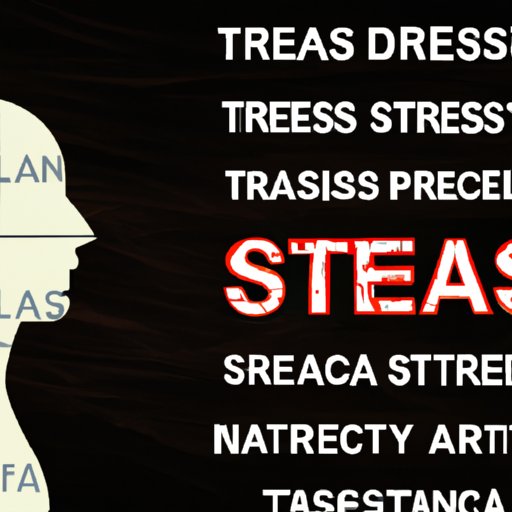
Introduction
Acute stress disorder is a mental health condition that occurs when a person has experienced or witnessed a traumatic event, such as a car accident, natural disaster, or assault. Symptoms usually appear within a month of the event and can last for up to four weeks. It’s important to identify and treat acute stress disorder early, as it can develop into post-traumatic stress disorder (PTSD) if left untreated.
Understanding Acute Stress Disorder: Symptoms, Causes, and Treatment Options
Identifying Symptoms
The most common symptoms of acute stress disorder can be grouped into three categories:
- Re-Experiencing Symptoms: These symptoms include flashbacks, nightmares, and intrusive thoughts about the traumatic event.
- Avoidance Symptoms: These symptoms include avoiding people, places, or things that remind the person of the traumatic event. They may also try to avoid thinking or talking about the traumatic event.
- Arousal Symptoms: These symptoms include difficulty sleeping, irritability, anger, and hypervigilance.
Causes of Acute Stress Disorder
There are several causes of acute stress disorder, including:
- Trauma Exposure: Witnessing or experiencing a traumatic event can lead to acute stress disorder.
- Brain Chemistry: People with certain brain chemistry may be more susceptible to developing acute stress disorder after a traumatic event.
Treatment Options
There are two main treatment options for acute stress disorder:
- Medications: Anti-anxiety and antidepressant medications may be prescribed to help manage symptoms.
- Therapy: Cognitive-behavioral therapy (CBT) and eye movement desensitization and reprocessing (EMDR) therapy are two effective types of therapy for acute stress disorder.
Overcoming Acute Stress Disorder: A Comprehensive Guide
Education and Information
The first step in overcoming acute stress disorder is to learn as much as possible about the condition and its symptoms. This can help provide a sense of control and understanding, which can lead to increased coping skills.
Self-Care Strategies
Self-care strategies can help manage symptoms of acute stress disorder, such as:
- Exercising Regularly: Physical activity can help reduce symptoms of anxiety and depression.
- Practicing Relaxation Techniques: Techniques such as deep breathing, meditation, and yoga can help reduce stress and anxiety.
Seeking Professional Help
It’s important to seek professional help if symptoms of acute stress disorder persist or worsen. There are several types of therapy that can be effective:
- Cognitive-behavioral therapy (CBT): This type of therapy focuses on identifying negative thoughts and behaviors and replacing them with positive ones.
- Eye movement desensitization and reprocessing (EMDR) therapy: This therapy involves guided eye movements while the person recalls the traumatic event, which can help reduce the intensity of the trauma.
In addition to therapy, medication may be prescribed to help manage symptoms.
The Science Behind Acute Stress Disorder and Its Impact on Mental Health
Neurology and PTSD
Studies have shown that the brain changes after a traumatic event, specifically in the amygdala and prefrontal cortex. Additionally, there are certain neurotransmitters involved in PTSD, such as dopamine and serotonin.
Impacts of Acute Stress Disorder on Mental Health
Acute stress disorder can increase the risk of developing other mental health disorders, such as anxiety and depression. Substance abuse is also a common coping mechanism for those with acute stress disorder.
Breaking Down the Myths and Facts About Acute Stress Disorder
Myths
- Only combat veterans can have acute stress disorder.
- It only happens immediately after a traumatic event.
Facts
- Anyone who has experienced or witnessed a traumatic event can have acute stress disorder.
- Symptoms can appear days or weeks after the traumatic event.
Coping Strategies for Those at Risk of Acute Stress Disorder
Positive Coping Strategies
- Engage in Relaxation Activities: Activities such as reading or taking a warm bath can help reduce feelings of stress and anxiety.
- Schedule Time With Family and Friends: Social support can be a crucial part of recovery from acute stress disorder or PTSD.
Negative Coping Strategies to Avoid
- Consuming Alcohol or Drugs: Substance abuse can worsen symptoms of acute stress disorder and increase the risk of developing other mental health disorders.
- Avoiding Feelings or Thoughts: Ignoring or avoiding feelings and thoughts related to the traumatic event can prolong symptoms and delay recovery.
Exploring the Relationship Between Trauma and Acute Stress Disorder
Types of Trauma and Their Impact on Acute Stress Disorder
Any type of trauma can lead to acute stress disorder, including:
- Violence and Abuse: People who experience violence or abuse, such as sexual assault or domestic violence, are at increased risk of developing acute stress disorder.
- Loss of a Loved One: The sudden loss of a loved one can lead to acute stress disorder.
Long-Term Effects of Trauma and Acute Stress Disorder
People with acute stress disorder are at increased risk of developing other mental health disorders, lowering their quality of life, and decreased immunity. If left untreated, it can develop into PTSD.
Conclusion
Summary of Key Points
Acute stress disorder is a mental health condition that occurs after a traumatic event, with symptoms that last up to four weeks. Treatment options include medication and therapy, and self-care strategies can also be effective. Coping strategies should focus on positive behaviors and avoid negative coping mechanisms like substance abuse. Everyone should seek professional help if symptoms persist or worsen.
Importance of Seeking Help
It’s important to seek help for acute stress disorder, as it can develop into post-traumatic stress disorder if left untreated.
Final Thoughts
Recovery from acute stress disorder takes time but is possible with the right treatment approach and support.




